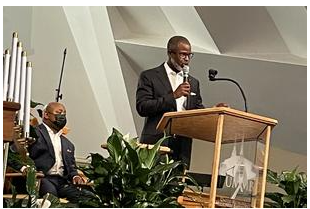Groundbreaking kicks off construction of Metropolitan Village, mixed-use project in Winston-Salem
- S.G. Atkins Community Development Corporation

- Sep 22, 2022
- 3 min read
Updated: Sep 27, 2023

A new multi-use development in east Winston-Salem intended to create good affordable
housing and provide critical medical services as well as connect the neighborhood to
Innovation Quarter is underway. A development group led by Liberty Atlantic Group of
Charlotte and backed by Atrium Wake Forest Baptist Health, APG Capital of Raleigh and
Pinnacle Bank held a Thursday groundbreaking for Metropolitan Village, a 324-unit housing
development adjacent to U.S. 52. The development is just across the highway from the dynamic Innovation Quarter at the intersection of East 5th Street and Metropolitan Drive.
Jr., the current pastor of the church. Jaron Norman, senior managing partner of Liberty Atlantic, presided over the ceremony, which included representatives of the partners as well as leaders of United Metropolitan Missionary Church, who assembled the 8.2-acre site
and provided the vision for the project. An enthusiastic crowd gathered under a large umbrella on the site during a light afternoon rain shower. The 275,000-plus square foot development will have townhomes, flats and apartments in addition to workforce training space and the 8,000-SF Maya Angelou Center for Health Equity from Atrium, which will be relocated on Vine Street. The townhomes will be along 4th Street with the three-story flats along 5th Street. All units, including the townhomes, will be rental properties.
The project received unanimous approval from Winston-Salem City council in a rezoning vote in April 2021. Estimated at $60 million in March, $65 million was the figured mentioned by partners on Thursday. Norman said Atrium was the "most significant equity contributor" to the project. Dr. Julie Ann Freischlag, CEO of Atrium Wake Forest Baptist Health, said she was not sure on a figure for Atrium's financial investment but expected to have an estimate soon.
Norman said Pinnacle is the primary lender for Phase I. Freischlag said supply chain issues make it hard for her to put a timeline on completion of the new Atrium facility. "A couple years — it's going to take some time," she said. Norman said much of the workforce training would be geared toward the health care industry. Innovation Quarter, which comes under the AWFBH umbrella, will supply strategy and advice to the project and serve as sort of a
liaison between different interests. Metropolitan Village is just across the 5th Street bridge over U.S. 52 from the quarter.
"We are trying to bring inclusive development and a new economic engine — sometimes with Atrium, sometimes with our other anchors," said Graydon Pleasants, Innovation Quarter head of real estate development. Pleasants said connecting Innovation Quarter across U.S. 52 to east Winston-Salem areas has always been an IQ goal. Norman said the development group had purchased the land for the community except for a "small percentage" that it has leased. Liberty Atlantic, a minority-owned company, is not only a developer but also has a financial stake in the project and will handle construction.
The project is planned in two phases. The first will begin immediately and take 18 months. It will include the 12 townhouses, 38 three-story lofts and 125 units. The second is planned to take 12 months. Many of the new residents will move from the remaining Garden Garden units last to be demolished for the project. Norman said Metropolitan Village will put an emphasis on
attracting essential, modestly paid members of the workforce. But neither the city or county will be providing money to supplement rent payments. "Every unit is below market rate," Norman said. "There are no municipal subsidies in this project." Norman said Liberty Atlantic believes its "new model" for affordable housing without government subsidies can succeed in other markets. When asked for details on the new model, Norman said it was
"complicated" and may be addressed in the future. Norman said some units would meet the city's definition for affordable housing while others will meet city standards for workplace units and essential housing. "We think it's a scaleable model we hope others can adopt,"
Norman said. Norman said Common Living, based in New York, would manage most of the residential units.
John Brasier
Reporter
Triad Business Journal




Comments